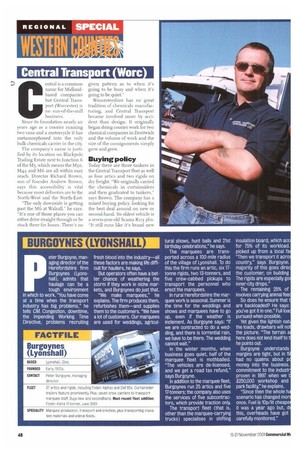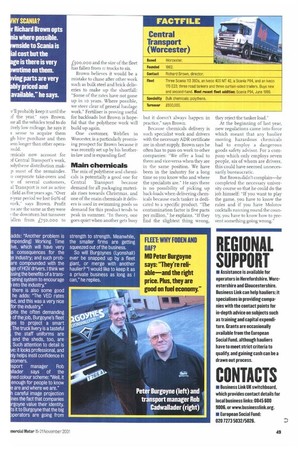C entral is a common name for Midlandbased companies but Central
Page 48

Page 49

If you've noticed an error in this article please click here to report it so we can fix it.
Transport (Worcester) is no run-of-the-mill business. Since its foundation nearly 20 years ago as a courier running two vans and a motorcycle it has metamorphosed into the only bulk chemicals carrier in the city.
The company's name is justified by its location on Bl-ackpole Trading Estate next to Junction 6 of the M5, which means the M5 o, M42 and MG are all within easy reach. Director Richard Brown, son of founder Andrew Brown, says this accessibility is vital because most deliveries are to the North-West and the North-East.
"The only downside is getting past the MG at Walsall," he says. "It's one of those places you can either drive straight through or be stuck there for hours. There's no given pattern as to when it's going to be busy and when it's going to be quiet."
Worcestershire has no great tradition of chemicals manufacturing, and Central Transport became involved more by accident than design. It originally began doing courier work for two chemical companies in Droitwich and the volume of work and the size of the consignments simply grew and grew.
Buying policy
Today there are three tankers in the Central Transport fleet as well as four artics and two rigids on dry freight. We originally carried the chemicals in curtainsiders and then graduated to tankers," says Brown. The company has a mixed buying policy, looking for the best deal around on new or second-hand. Its oldest vehicle is a seven-year-old Scania R113 360. "It still runs like it's brand new
.e'll probably keep it until the 3f the year," says Brown. Ise all the vehicles tend to do ively low mileage, he says it s sense to acquire them gh hire purchase and then tern longer than other opera'ould.
.i.nicals now account for Central Transport's work, )olythene distribution makp most of the remainder. o corporate take-overs and -e of several customers, al Transport is not as active ; field as five years ago. Over e-year period we lost Go% of cork," says Brown. Profit ns are the same as they were the downturn but turnover -alien from 1750,000 to
£500,000 and the size of the fleet has fallen from in trucks to six.
Brown believes it would be a mistake to chase after other work such as bulk steel and brick deliveries to make up the shortfall: Some of the rates have not gone up in TO years. Where possible, we steer clear of general haulage work." Fertiliser is proving useful for backloads but Brown is hopeful that the polythene work will build up again.
One customer, Webflex in Worcester, is a particularly promising prospect for Brown because it was recently set up by his brotherin-law and is expanding fast!
Main chemicals
The mix of polythene and chemicals is potentially a good one for Central Transport because demand for all packaging materials rises towards Christmas, and one of the main chemicals it delivers is used in swimming pools so demand for this product tends to peak in summer. "In theory, one goes quiet when another gets busy but it doesn't always happen in practice," says Brown.
Because chemicals delivery is such specialist work and drivers with the necessary ADP. certificate are in short supply, Brown says he often has to pass on work to other companies: "We offer a load to them and vice-versa when they are in the same position. We have been in the industry for a long time so you know who and where the specialists are." He says there is no possibility of picking up back-loads when delivering chemicals because each tanker is dedicated to a specific product. "The contamination factor is five parts per million," he explains. "If they find the slightest thing wrong, they reject the tanker load."
At the beginning of last year, new regulations came into force which meant that any haulier moving hazardous chemicals had to employ a dangerous goods safety advisor. For a company which only employs seven people, six of whom are drivers, this could have seemed unnecessarily bureaucratic.
But Brown didn't complain—he completed the necessary university course so that he could do the job himself: "If you want to play the game, you have to know the rules and if you have Molotov cocktails running round the country, you have to know how to prevent something going wrong."




























































































































































